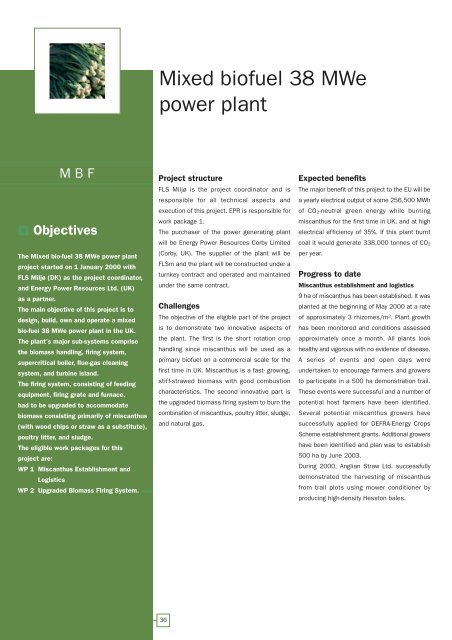European Bio-Energy Projects
European Bio-Energy Projects
European Bio-Energy Projects
You also want an ePaper? Increase the reach of your titles
YUMPU automatically turns print PDFs into web optimized ePapers that Google loves.
MBF<br />
Objectives<br />
The Mixed bio-fuel 38 MWe power plant<br />
project started on 1 January 2000 with<br />
FLS Miljø (DK) as the project coordinator,<br />
and <strong>Energy</strong> Power Resources Ltd. (UK)<br />
as a partner.<br />
The main objective of this project is to<br />
design, build, own and operate a mixed<br />
bio-fuel 38 MWe power plant in the UK.<br />
The plant’s major sub-systems comprise<br />
the biomass handling, firing system,<br />
supercritical boiler, flue-gas cleaning<br />
system, and turbine island.<br />
The firing system, consisting of feeding<br />
equipment, firing grate and furnace,<br />
had to be upgraded to accommodate<br />
biomass consisting primarily of miscanthus<br />
(with wood chips or straw as a substitute),<br />
poultry litter, and sludge.<br />
The eligible work packages for this<br />
project are:<br />
WP 1 Miscanthus Establishment and<br />
Logistics<br />
WP 2 Upgraded <strong>Bio</strong>mass Firing System.<br />
Mixed biofuel 38 MWe<br />
power plant<br />
Project structure<br />
FLS Miljø is the project coordinator and is<br />
responsible for all technical aspects and<br />
execution of this project. EPR is responsible for<br />
work package 1.<br />
The purchaser of the power generating plant<br />
will be <strong>Energy</strong> Power Resources Corby Limited<br />
(Corby, UK). The supplier of the plant will be<br />
FLSm and the plant will be constructed under a<br />
turnkey contract and operated and maintained<br />
under the same contract.<br />
Challenges<br />
The objective of the eligible part of the project<br />
is to demonstrate two innovative aspects of<br />
the plant. The first is the short rotation crop<br />
handling since miscanthus will be used as a<br />
primary biofuel on a commercial scale for the<br />
first time in UK. Miscanthus is a fast- growing,<br />
stiff-strawed biomass with good combustion<br />
characteristics. The second innovative part is<br />
the upgraded biomass firing system to burn the<br />
combination of miscanthus, poultry litter, sludge,<br />
and natural gas.<br />
36<br />
Expected benefits<br />
The major benefit of this project to the EU will be<br />
a yearly electrical output of some 256,500 MWh<br />
of CO2-neutral green energy while burning<br />
miscanthus for the first time in UK, and at high<br />
electrical efficiency of 35%. If this plant burnt<br />
coal it would generate 338,000 tonnes of CO2<br />
per year.<br />
Progress to date<br />
Miscanthus establishment and logistics<br />
9 ha of miscanthus has been established. It was<br />
planted at the beginning of May 2000 at a rate<br />
of approximately 3 rhizomes/m2. Plant growth<br />
has been monitored and conditions assessed<br />
approximately once a month. All plants look<br />
healthy and vigorous with no evidence of disease.<br />
A series of events and open days were<br />
undertaken to encourage farmers and growers<br />
to participate in a 500 ha demonstration trail.<br />
These events were successful and a number of<br />
potential host farmers have been identified.<br />
Several potential miscanthus growers have<br />
successfully applied for DEFRA-<strong>Energy</strong> Crops<br />
Scheme establishment grants. Additional growers<br />
have been identified and plan was to establish<br />
500 ha by June 2003.<br />
During 2000, Anglian Straw Ltd. successfully<br />
demonstrated the harvesting of miscanthus<br />
from trail plots using mower conditioner by<br />
producing high-density Hesston bales.

















